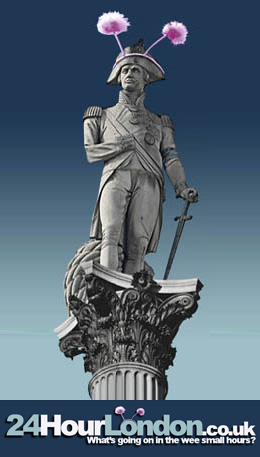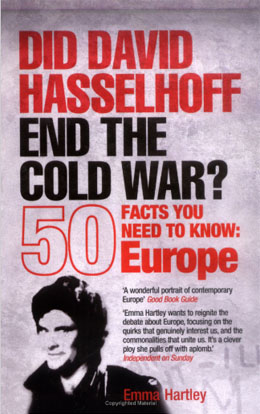This is a story of old media versus new.
Before I elaborate, here's a picture of Britain's first folk music satellite.
OK. Not so much a picture as an artist's impression of Hylas 1, which is owned by Hughes and rents enough capacity to Mr and Mrs Denscombe all year round, via a company called Avanti, for an unlimited number of people to watch their webcast at any given time. And what the Denscombes use it for, 98 per cent of the time, is streaming high definition images of folk music from festivals. It's a folk music satellite.
This big thing had a small beginning. Neil Pearson, one of the three directors of the Shrewsbury festival, explained that the people at the back of the tent couldn't see very well.
"Our main stage is in a big tent that holds about three and a half thousand people and the view at the back is from some distance. So we decided we needed to put up screens either side of the stage. [The Denscombes] supplied footage for those screens with a five camera shoot the first time. That was 2008.
"Everything that was filmed was also recorded, purely for on-site reasons. Then the next year we thought 'Well, we can do this. So what else can we do with this technology?' We'd had some feedback and comments and some people said that they would have loved to have seen the main stage at certain points of the day - especially in the evening - but were back at their tent looking after their kids. So we thought about putting wifi around the site.
"The guy who was doing the filming - Charles Denscombe - is a real technology guy, who's interested in working on the margins of what's possible. So we got a wifi network installed around the site and in 2009 everything that was on the screens at the side of the stage was also available on the Shrewsbury festival wifi network.
"Then we looked at the costs and we had this big satellite dish on site, connecting us with broadband via a satellite. This gave us enough capacity to broadcast out as well.
"We needed the satellite for the free wifi - which allowed people to tweet and Facebook about the festival - but in 2010 we were able to webcast the festival and last year 14,500 people in 35 countries watched it."
I first became aware of live webcasting as a result of the buzz around the American festival Bonnaroo this year, which webcast Radiohead's headlining show among others. The buzz among my friends was unavoidable. I knew it was happening because I read them talking about it on Facebook and Twitter beforehand and then I read about it afterwards on Facebook, eventually tuning in to have a look for myself. I caught a replay.
Charles provided the same service for Shrewsbury last year and believes that he's doing something for the first time. "We think of ourselves as the UK's first micro-broadcaster. No one can compete with us because by comparison with traditional outside broadcasting - involving cameramen, cranes swinging around and hundreds of thousands of pounds worth of equipment - we could almost turn up for free.
"We're two retired teachers and an eight year old transit van. But we run a system that produces broadcast quality, high definition, high volume television, which we can produce with no intrusion to the paying audience."
This is possible because of a network of static cameras placed around the stage, operated remotely and robotically by one person in the transit. This is usually Heather, who does the vision mixing, although they have an enthusiastic crew of around 12.
"Also we're able to give the performers a DVD of their performance 20 minutes after it's over, to take away and use as they wish. What we often find is that they come back to us and ask for a small amount of re-editing and for us to help them put it up on YouTube."
This year's Shrewsbury tickets, which went on sale in December, were sold out by April, and I wonder whether this might be partly because of Shrewsbury's presence on YouTube. From the point of view of this blog, when I'm looking for video footage to embed in a post to illustrate what a musician does - which, when you think about it, is absolutely central to successfully conveying what I'm on about - I have chosen Shrewsbury footage over and over again because it's high definition and professionally edited, making it miles better than nearly everything else. I was a fan of Charles' and Heather's work before I even knew they existed.
When I spoke to someone from the Cambridge festival - broadcast by Sky - a couple of weeks ago they were only 92 per cent sold out and it's hard to see what else the difference could be? Sky Arts - where Cambridge will be shown this year - is only available to those with a Sky subscription and then only when Sky chooses to broadcast it, whereas Shrewsbury is available for free 24 hours a day, all year round. Ask yourself: which is the better marketing proposal?
Webcasting the festival and then making the footage available is, for practical purposes, exactly the same model as hearing music on the radio several times before deciding to buy a CD. Watching footage from Bonnaroo made me want to go there as well as appreciate the musicians. Obviously, a strong web presence also enhances a festival's appeal to advertisers.
It's as if someone has pulled all the cabling out of the back of the old model of how to market music and festivals, and is rewiring it for the digital age.
"I've come to see that there are two types of performers," Mr Denscombe said. "One, who is usually American - let's call them the Thompsons - question what we're up to when they see there are cameras and want to know what their cut is. These guys are used to being filmed for television. But then there are the folk singers who haven't two beans to rub together - which is most of them - who are absolutely delighted with our services because if they had to pay for them in totality they probably couldn't afford them."
So the Denscombes' way of doing things works really well for individual performers, raising their profiles, as well as promoting the genre as a whole.
The Denscombes, who began their business filming nativity plays and weddings, are pushing at the limits of what's technologically possible, using their wits and the technical and engineering skills they learnt partly while they were helping people to pass their GCSE technology. Mrs Denscombe describes her husband as "a bit of an inventor".
They have used the money they got when they retired from teaching to build their outside broadcast van and now they're looking for more work.
* If you run a music festival that's looking to shore up its position in the festival calendar, or know a band with a tour planned that wants to build some momentum, you could reach Charles and Heather here.
* If you'd like to receive posts from this blog directly into your Facebook news feed, you could make it so by *liking* its Facebook page. Or follow me on Twitter @emma1hartley




Thanks for this. Now settling down to watch the complete 90 min film of Shrewsbury on Youtube. Don't get the satellite thing though.
ReplyDelete